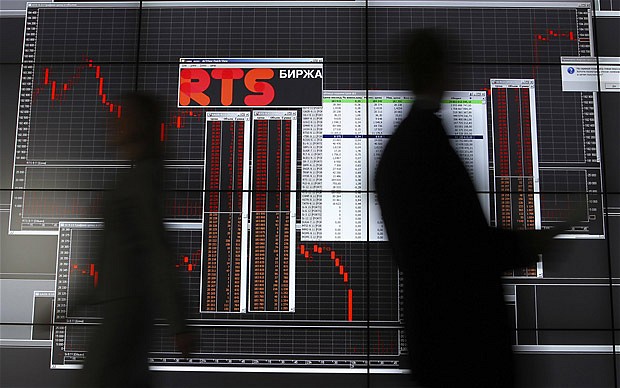
Russia Is Giving up on Its Tragedies—and on Itself
Publication: Eurasia Daily Monitor Volume: 13 Issue: 45
By:

President Vladimir Putin’s approval rating is regularly accepted as a proxy measure for the level of Russia’s internal cohesion. And his support remains on a sky-high plateau, where it has stood since the explosion of jingoism caused by the annexation of Crimea in March 2014 (Levada.ru, February 26). However, powerful and divisive forces are eroding this purported cohesion, turning Russian society into a disillusioned and apathetic crowd—resembling the nation that failed, 99 years ago, to turn the dethroning of Tsar Nicolas II into a lasting liberating moment. Nikita Khrushchev’s criticism of Josef Stalin’s “personality cult,” 60 years ago, at the 20th Congress of the Communist Party of the Soviet Union (CPSU), was another failed example at liberating the country from autocracy. The burden of responsibility for the crimes of totalitarianism proved too heavy (Gazeta.ru, February 25). Stalin’s grave on Red Square was covered with flowers last Saturday (March 5), on the day of his death; and many Russians still cherish or long for a “firm hand,” no matter the millions of destroyed lives such authoritarian leadership has historically produced (Slon.ru, March 4).
This urge to escape from the apparent dead end of the present by reliving the “glorious” past translates into a desire to ignore the disasters that mark Russia’s current decline. On February 25, an explosion in the Severnaya coal mine, in Vorkuta, left four people dead and 26 stranded some 800 meters below the surface; another explosion, three days later, killed six rescue workers and condemned to death the miners in the inaccessible shaft (Novaya Gazeta, February 28). Putin held a business-like meeting with the head of the Industrial Supervision Service and dispatched Deputy Prime Minister Arkady Dvorkovich to meet with the aggrieved relatives, who knew all too well about the orders to keep working despite the dangerously high concentration of methane in the mine (Moscow Echo, March 4). Putin expressed no public condolences, and the official media barely covered the tragedy, focusing instead on the Syrian ceasefire and the migrant riots on the Greek-Macedonian border (Forbes.ru, March 2).
This propaganda trick of not reporting bad domestic news answers the preference of many Russians not to hear them. The crash of a Sukhoi Su-25 bomber a week ago was barely mentioned in the media and did not invite any questions about the long series of deadly accidents in the Air Force (Kommersant, February 29). Explosions in the oil drilling rigs are also routinely bracketed out, as are most urban fires. Illustratively, a gas explosion that destroyed a house in Yaroslavl in mid-February made it into the news cycle only because the supplier charged the affected inhabitants the full monthly price for deliveries (Rbc.ru, March 4). Most recently, the horrible crime perpetrated by a 38-year-old Uzbekistani nanny (who turned out to be mentally unstable), who killed and beheaded a four-year-old girl and went to a Moscow metro station with the child’s decapitated head in order to protest against the intervention in Syria, shocked Russians in the capital city. Yet this news was not covered by any of the main national TV channels (Kommersant, March 1; Moskovsky Komsomolets, March 3). It was certainly not the macabre nature of the murder that discomfited the state-controlled media into silence. After all Russian TV stayed for weeks on the fictitious story about the kidnapping and rape of a Russian girl in Berlin, pushing German authorities to open an official investigation into this “black propaganda” coming out of Moscow (Novaya Gazeta, February 9).
Such Russian manipulations of public opinion may be more or less successful, but they add to the general trend of declining domestic self-confidence and growing pessimism. Presumably, Russians do not need a signal from Moody’s about the further downgrading of Russia’s credit rating to see the unfolding economic crisis (Polit.ru, March 5). Most families have had to cut their expenses and dip into their savings, and they still cannot balance their budgets (Nezavisimaya Gazeta, March 3). Every visit to a supermarket brings new irritation: the quality of food deteriorates due to the contraction of imports by more than a third, while prices keep growing because domestic agricultural production is stagnant (Moscow Echo, March 5). Individual survival strategies now have a time horizon of only about a year. But even for the majority of those who have recently fallen out of the middle class, protests are perceived not only as useless but also too risky (Open Russia, March 3).
Little hope remains that the government will come up with a meaningful anti-crisis policy, while anger is deepening against bureaucratic predation and corruption, which effectively cancels out the residual “patriotic” mobilization within society directed against Russia’s ostensible external enemies (Gazeta.ru, March 4). The liberal opposition has tried to harness this anger. The anti-regime movement gained new energy from the march in Moscow in memory of Boris Nemtsov, who was murdered a year ago (Novaya Gazeta, February 29). The attention of like-minded Russians has now been focused on the staged trial of Ukrainian soldier and politician Nadezhda Savchenko, who is accused of war crimes based on blatantly fabricated evidence (Ezhednevny Zhurnal, March 4). She was denied the opportunity to make a closing statement in this phony trial. So instead, she published it online, rejecting the Russian totalitarian regime’s right to judge her fight for Ukrainian independence and expressing sympathy to all “honest, kind and decent people” in Russia (New Times, March 4).
Every word uttered by the defiant Savchenko and every flower laid along the bridge where Nemtsov took his last breath of chilly Moscow air chip away at Putin’s monolithic police state and public support. He has no way of knowing when these cracks in the façade will suddenly connect and cause his system to collapse. But his courtiers realize there is growing disappointment among those who wistfully remember the “firmness” of the Soviet past as well as a growing disillusionment among those who gained a modicum of success in the post-Communist years of petro-prosperity. Support for the regime stems primarily from the worries in most social groups that any alternative would be worse. This fear of change in the situation of progressive deterioration amounts to giving up on the attempts to pull Russia out of the violent quagmire it is sinking into. Opposition leaders—like Alexei Navalny or Mikhail Kasyanov—who try to convince Russians to shoulder the responsibility for their country, have to fight not only under severe duress but also against apathy and resignation. Putin encourages these feelings, but as a result, he is presiding over a protracted disaster, which accelerates with his every attempt to assert control.




